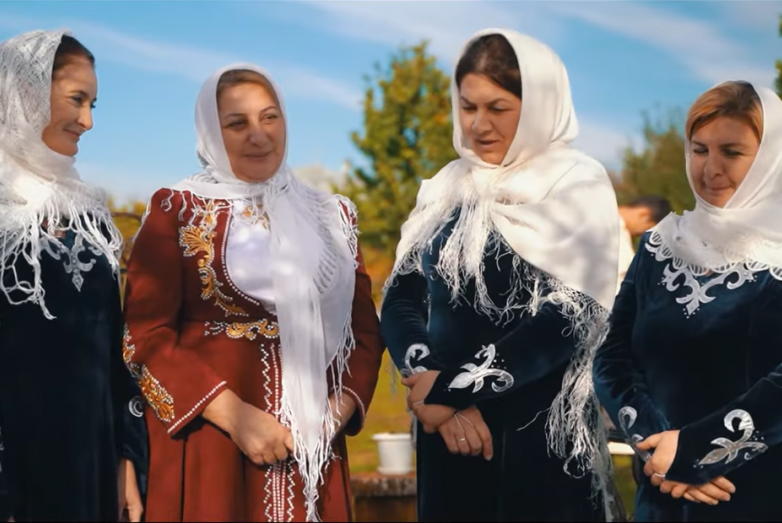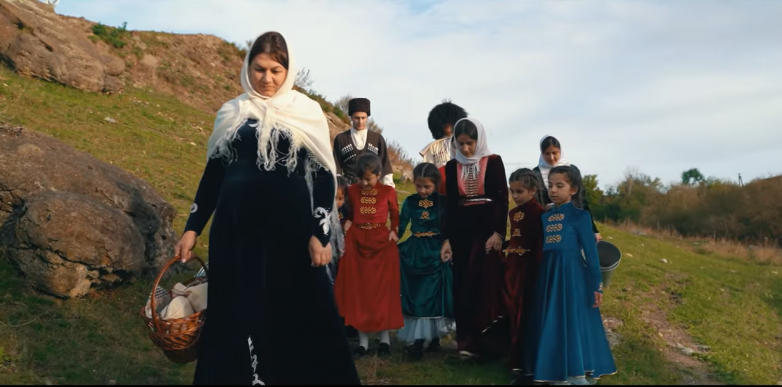The "Amazara" joint project of the WAC and the ANO "Alashara" continues the cycle of videos on Abaza wedding and post-wedding rites.
The cycle of video films on Abaza wedding and post-wedding rites continues the "Amazara" project of the World Abaza Congress and the International Association "Alashara" on the intangible heritage of the Abkhazians and Abaza.
Four videos out of 10 prepared - "The first solemn procession of a young daughter-in-law to fetch water", "Passing a needle to a young daughter-in-law", "Cooking chicken with gravy from Fatima Adzhieva", "Cooking a sweet dessert" – are already available on the Alashara website.
By decision of the Chairman of the Supreme Council of the WAC, Mussa Ekzekov, the process of creating a cycle of video films about wedding rites was started by the team of the Department of ANO "Alashara" "Family and Children" and the activists of the Women's Councils of the Abaza villages.
The cycle of videos tells in detail about the wedding and post-wedding ceremonies. The initial stage in the work was the collection of field information for creating scripts for films. The main source of information was the stories of the representatives of the older generation in the Abaza villages. Each plot is a systematic reconstruction of various wedding and post-wedding ceremonies, which clearly demonstrate the entire ceremony of their conduct, revealing their deep meaning.
The first video of the cycle "The first solemn procession of a young daughter-in-law to fetch water" tells how the bride who came to the house through traditional rites was involved in the life of a new family. Namely, the transfer of responsibilities to fetch water for the whole family, cook and put everything in order. On the 4th day after marriage, the young daughter-in-law, along with her neighbor girls, was sent to bring water. If at that time someone came to visit the new daughter-in-law, he was told that "she went to fetch water", and he understood that this was her first visit to neighbors and fellow villagers. The plot reveals the essence of the meaning of the transfer of responsibilities as the first step in the continuity of generations: from older to younger.
The second video "Giving the needle to the young daughter-in-law" tells about the post-wedding ceremony of the Abaza - the transfer of the needle to the young daughter-in-law. In a new family, the daughter-in-law begins to sew only after a certain ritual, during which she is initiated into some secrets and traditions of her husband's clan. The four-minute video tells how this symbolic post-wedding ceremony took place.
Any Abaza feast - festive or memorial - begins with chicken with gravy. The third video "Cooking chicken with gravy from Fatima Adzhieva" reveals the secrets of cooking the Abaza national dish "квтIужьдзырдза" (translated from Abaza as "chicken with gravy"). These secrets are shared by an experienced cook, chairman of the Women's Council of the village of Inzhich-Chukun, Fatima Adzhieva.
The fourth video "Cooking a sweet dessert" was recorded in the master class format on making a sweet dessert "kaltama". The process of its making is shown by the chairman of the Women's Council of the village of Kazma, Asiyat Urchukova.
A young Abaza director and screenwriter Aslan Apsov directed the films. All four films were shot by videographer Dinislam Sheremetov according to the scenario of the head of the Department of ANO "Alashara" "Family and Children" Natella Dzhemakulova.
According to Natella Dzhemakulova, the excellent result of the work of the whole team is the merit of "director’s professionalism".
"The professional work of the director created a serious working atmosphere for all the participants in the filming process. Everyone thoroughly followed the instructions. The only funny moment that I had to work on and reshoot more than once was lifting buckets of water. For our girls, who had never held a yoke before, it became a difficult task to gracefully lift the buckets on camera," she shared.
Video film director Aslan Apsov, in turn, noted the importance of the project as a whole.
"Many customs and traditions of the Abaza people have been lost in time. Every day it becomes more difficult to say anything about this or that ritual. Not to preserve, not to inherit the customs and traditions of one's ancestors means to lose one's history," Apsov said.
This year, the main project of the Women's Councils of the ANO "Alashara" was the preparation of this cycle of 10 videos, the completion of which will be the creation of a full-length documentary about the traditional Abaza wedding with a series of beautiful original rituals of the Abaza people.
"Amazara" is a joint project of the World Abaza Congress and the International Association "Alashara", aimed at preserving the intangible cultural heritage of the Abaza people. The author of the project idea is Mussa Ekzekov, Chairman of the Supreme Council of the WAC.


to login or register.